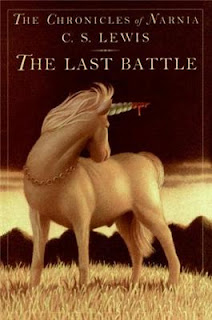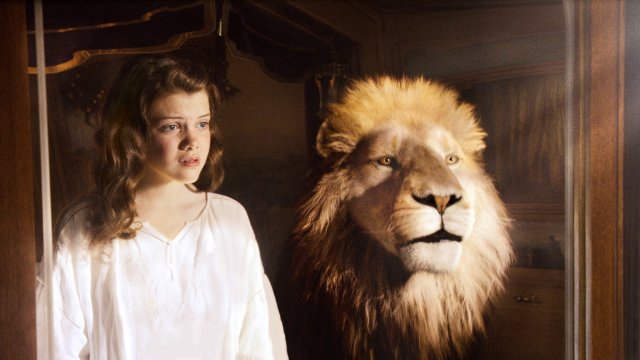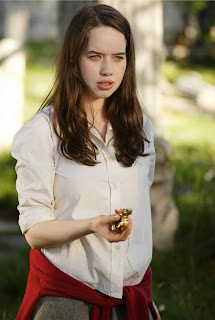The Chronicles of
Narnia is a lovely series of books, and one that was integral to my own
childhood. If you’re not familiar, they’re about a group of children who,
through various magical means, find themselves in the magical kingdom of
Narnia, where animals talk and the trees can dance, and have to save the day.
It’s about heroism and being true to yourself, bravery, faithfulness, and
honesty. Really, they’re lovely books.
They’ve gotten a bad rap in the past few decades, though,
because the books were written by a noted Christian theologian, C.S. Lewis
(seriously read some of his other stuff, it’ll blow your mind AND it’s funny).
Lewis’ intent in writing the books was to create children’s stories that
engaged the imagination while also teaching kids how to be basically good
people. This all seems fine to me.
The place a lot of people take issue, though, is with the
character Aslan, who appears in all of the books at least a little. Aslan is a
giant, magical, talking lion, who appears out of nowhere to give the characters
good advice and help them to achieve their goals. The general problem with him
is that he’s a bit of a Christ-figure. Which is true. But so is Harry Potter.
More generally, the stories seem to be disliked because the
Christ-figure, combined with the general message of redemption and becoming a
new person (a King or Queen of Narnia), is generally associated with Christian
theology. And I’m not denying that. I’m more saying that if you’re worried your
child is going to be brainwashed by a magical talking lion, you should probably
restrict their access to Lord of the
Rings, Doctor Who, the
aforementioned Harry Potter, and definitely
the Redwall books too. Just saying,
that’s a lot of messianic figures in children’s pop culture.
But this doesn’t mean that Chronicles of Narnia is a completely easy book to read to your kids
and then forget about. Like all of the best children’s literature, it deals
with hard issues. The characters take on subjects like envy, greed, loss of
faith, and lust for power, in ways that are both creatively written and
occasionally hard for adults to read. I for one have always had trouble with
the greed section in Voyage of the Dawn
Treader. Makes me squirm every time.
Of the books, the hardest two are generally agreed to be the
first and last: The Magician’s Nephew
and The Last Battle, respectively. The Magician’s Nephew concerns itself
with the creation of Narnia and the rise of the White Witch. She is presented
as an ancient evil who will always be fighting for the soul of Narnia, and for
the soul of the children.
That’s a rough concept for a kid’s book. The idea that there
is real evil out there, and that it’s evil that wants them dead is both very
hard to hear, and yet also something that kids respond to innately. Why else
are so many of our great stories about good versus evil? It’s hardwired in our
brains that there is an enemy, and we are fighting it. So in this way, the
first book is probably easier for kids than adults.
 |
| Yes that is a bloody unicorn. Inorite? |
But the last book, it’s pretty hard for everyone.
In The Last Battle,
Narnia is falling. It’s the end of the world. All of the wonderful friends that
you’ve made in the past few books are dying by the dozen in a final war against
evil. Eventually it comes down to a few of our heroes huddled in the back of an
old barn, waiting to die.
Tough shit for a kid’s book, like I said.
And it only gets tougher. As they’re sitting there, a few of
them start to feel Aslan’s breath on their faces. They turn towards it, and see
that the barn actually opens onto a garden. They get up to go, and urge the
others to join them, but the others can’t see and don’t believe. So, our heroes
leave. They go into the garden.
The garden turns into another garden and on and on, until
they reach a gate, where they know that beyond is Aslan’s kingdom, a place none
of them have been. Above them appear the faces of Peter, Edmund, and Lucy,
showing that they have also made it to Aslan’s kingdom and welcoming their
friends home.
It’s lovely.
Except for the bit where Susan’s face, one of the original
four children to go to Narnia, is missing.
Not only does the book paint a picture of death and heaven,
it also makes the assertion, and holds to it, that not everyone gets to go to
heaven. And Susan didn’t make the cut, just like the people who couldn’t see
the light back in the barn.
Like I said, it’s a rough message to take no matter what age
you are.
But there’s an important reason why the message needs to be
made. Narnia is not a real place. Obviously. What is real, though, is the
transformation of the people who go to Narnia. Narnia is real insofar as it
changes people’s lives. When Edmund went there the first time, he was a
horrible little git who nearly ended the world. When Eustace first went, he was
a wet blanket whose greed nearly destroyed the voyage. You can see my point.
Being in Narnia meant that the characters could be
transformed by their adventures and their interactions with Aslan, and come
home as better, changed people. And that seems fine to me. Good even. Because a
story about redemption means that the character has to start out somewhere bad.
But you persevere and you overcome and you change. You become a King or Queen
of Narnia.
So why can’t Susan come too?
Well, Susan didn’t change.
In the only two books where she appears, Susan is a kind,
lovely girl who helps all her siblings. She takes care of them, watches over
them, and loves the adventures they have. But after that, she grows up. She
stays the same person she was, and she doesn’t let Narnia change her. Susan is
Susan. She wasn’t awful to begin with, but she didn’t get any better because of
what happened in Narnia. She just is.
And for that, she can’t come back.
In order for transformation to be clear, we have to see the
one who hasn’t changed. Susan can’t go to Narnia, because we need to understand
that growth, real growth is hard and might not last. We have to see how hard it
is to know that it’s worth it. So Susan can’t come. If being good, truly good,
were easy, everyone would do it. And that’s not the point Lewis is making here.
In reality, it’s hard. Insanely difficult. To remain as
wide-eyed as a child and as innocent, while still living a good and rich life?
That’s nearly impossible. But if we didn’t see how impossible it is, we wouldn’t
realize how good it is to do that.
In the book, it says some simple things about how Susan
forgot Narnia and started to only think about lipstick and dancing, and some
critics have pounced on that and said that Lewis was anti-woman. I disagree.
Really, what he accused Susan of was growing up.
Growing up, and forgetting how to be a child. How to be
changed.
So, no. Chronicles of
Narnia is not an easy series to read to your children, or to read to
yourself. It’s full of characters dying, making terrible decisions, betraying
each other, sacrificing for each other, and it has a messianic talking lion.
But it’s good. It’s so good. And the lessons it teaches children are precisely
the lessons that children should learn.
Be good. Be changed. Be the King or Queen you have inside
you, and don’t let anything take that away. Remember Narnia.
How can you hate that?
 | ||||
| "Is he safe?" "Safe?...Of course he isn't safe! But, he's good." |





Thank you for getting Susan right. Also, don't forget the dedication on the first page of The Lion, the Witch, and the Wardrobe:
ReplyDelete"My Dear Lucy,
I wrote this for you, but when I began it I had not realized that girls grow quicker than books. As a result you are already too old for fairy tales, and by the time it is printed and bound you will be older still. But some day you will be old enough to start reading fairy tales again..."
Susan grew up. But that doesn't mean there isn't any hope for her in Narnia.
That's a fair point. But from a subtextual narrative standpoint, she couldn't go there at the same time as everyone else, because then the story wouldn't have any stakes.
DeleteIt is so sad that Edmund Peter Lucy and Susan cant go back to Narnia and that that they cant see Aslan again. I really wished they could go back whenever they want. Also at the end of the last Narnia I wish Peter and Susan were there to and I wished Lucy Edmund peter Susan would've stayed together cuz they r family and I bet they would miss Peter and Susan.
DeletePeter was there!!!! Ddduuuhhhh!!!
DeleteThis comment has been removed by the author.
ReplyDeleteYour right
Delete